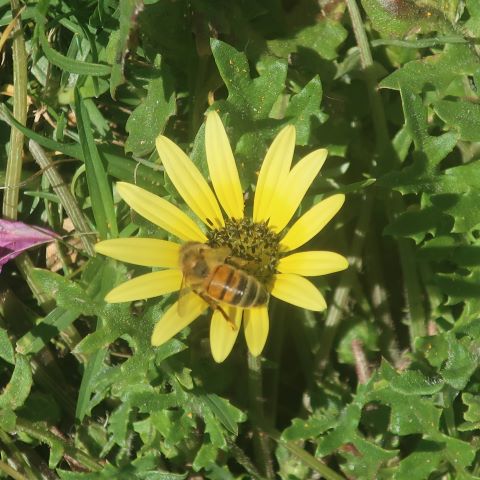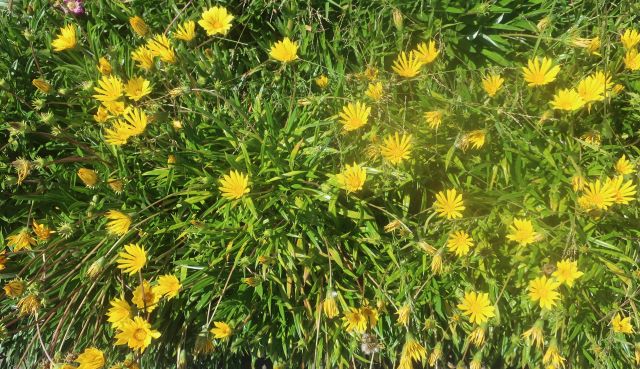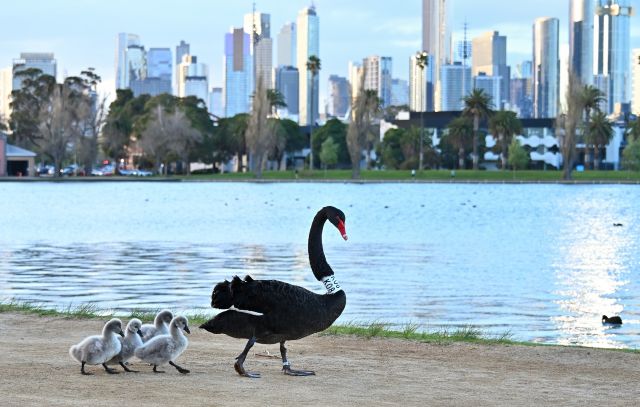The weeds are as high as …
Today, the Bureau of Meteorology released its October statement. The headline: ‘wetter than average’. There were 20 days with rainfall this month, with Olympic Park recording a monthly rainfall total of 110.4 mm, the highest October rainfall total since 2010.
The grass, and the weeds, have responded with record growth, leading to complaints about lawn mowing across Port Phillip.
The City of Kingston got off on the front foot, writing on its facebook page ‘The grass is getting a little long in some of our parks and reserves, and we wanted to let you know that we’re working on it. Recent weather has made for perfect grass-growing conditions but has left many of our parks and reserves very wet, making them difficult to access for mowing. We appreciate your patience and understanding during this unpredictable weather period, and are working hard to get our local areas looking great for the busy spring and summer months ahead! (October 24th)
The pace and rate of growth has highlighted another issue. As reported on *PS Media, Port Melbourne’s Stephen Blair became increasingly frustrated with seeing the grass so long on some of Port Phillip’s more prominent median strips. Failing to get a satisfactory response from the authorities, Blair took to the Beaconsfield median strip, suitably hi-vized, first with a hand mower, and then a ride-on mower, in a move calculated to interrupt the buck passing of which the Council and the Department of Transport was accused.
The genesis of this situation goes back to 2020 when, driven both by a desire to cut council expenditure and respond to the loss of revenue incurred during the pandemic, the Council sought feedback via its online platform on which programmes and services could potentially be cut. Mowing the medians was one option identified.
The responsibilities of council and the Department of Transport are meticulusly described in the Council’s Road Management Plan. Local roads are the responsibility of the Council, whereas arterial roads are the responsibility of the Department of Transport, or D o T for short. Arterial roads are the major roads that connect local roads to the broader network such as Beaconsfield Parade, Pickles St, and Ingles St. Bay St is an arterial road too. Its dishevelled state doesn’t help with Bay Street’s civic pride.
As the pop up bike lanes controversy revealed, people in Port Phillip are very proud of ‘local visual amenity’; and this untidiness is a source of irritation across the municipality from Brighton Rd to Bay St.
For many, many years, it was a convention that the Council maintained the median strips on arterial roads even though it cost more than they were re-imbursed, as it presented the municipality as a coherent, cared for place.

Some cities in Europe and the US encourage ‘no mow’ areas in early spring before other flowers are out for pollinators.
In the untidy medians, weeds of every description flourish. These bees relish the Cape Weed flowers.
European honey bees are super generalists whereas many local native bees have particular affinities with locally indigenous plants.
Biodiversity is assailed on every front. Next to land clearing, environmental weeds are the biggest threat to biodiversity. What does this mean for weeds and biodiversity in cities, and in our city, Port Phillip?
Over several decades Port Melbourne’s coastal dunes have grown in extent. The dunes, fenced in 2012, are covered with indigenous coastal grasses and sedges including spinifex sericeus, ficinia nodosa and carex pumila. Sand gets trapped in the hairy leaves of the spinifex and helps to build dunes. The long runners reach out and trap even more sand, and so the dunes are shaped. These hard working plants stabilise the dunes which are the front line of defence of the blue stone wall. The quality of our dune vegetation is far richer than in many less urbanised places along the Victorian coast.
Immediately opposite this precious natural asset, and throughout the City of Port Phillip, gazanias have been planted in kerb outstands and roundabouts. Gazanias are an invasive environmental weed of South African origin. The seeds are spread by wind and water. Gazania come in many colours and shades. They’re bright and cheery but they are a menace to biodiversity. If you have travelled in regional Victoria recently your will have seen gazanias completely out of control on roadsides from central Victoria to the Wimmera.

Gazanias have already been observed amongst the dunes.
You might argue that the city is far from being a pristine environment where such things matter.
Next week world leaders meet for COP 27 climate talks. There is an increasing recognition that the climate and the biodiversity crisis are entirely interlinked and interrelated. In 2020 world leaders signed the Leaders Pledge for Nature. Anthony Albanese joined them by signing the pledge in September this year. The pledge commits its signatories to reverse biodiversity loss by 2030 for sustainable development. And to deliver a nature-positive world by 2030. As with greenhouse gas reduction commitments, the pledge for nature needs to flow through all levels of government if it is to be achieved. At present, Council documents have bland references to biodiversity, a city ‘where biodiversity flourishes’, that do not reflect the urgency or the role that they could play in creating a nature positive city.
The Leaders Pledge for Nature (2020) The UN biodiversity conference (Cop15) will take place in Montreal in December.




Shy
Loved the spider information. Such smart insects. Pity about the Gazanias. The floral equivalent of the succes of eucalypts spreading worldwide.